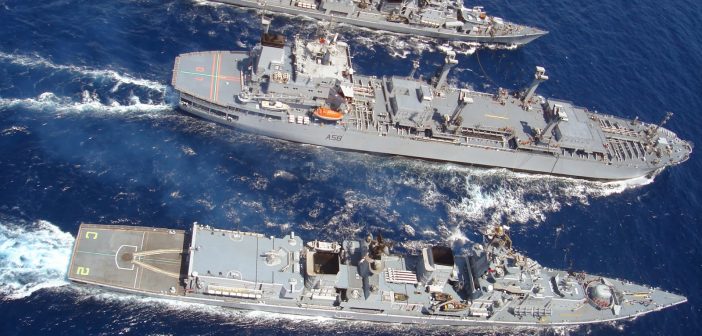In the shifting tides of geopolitics, the Indo-Pacific region stands as a crucible of strategic competition, with India and China vying for dominance. Central to this contest is maritime power projection, where control over crucial sea lanes and naval bases holds paramount importance. As China’s naval ambitions expand, India finds itself compelled to fortify its maritime presence by establishing more naval bases and ports across Asia and the Middle East.
The Need for Naval Expansion:
India’s strategic imperative for expanding its naval bases stems from the rapid rise of China as a maritime power. China’s assertive actions in the South China Sea and the Indian Ocean have raised concerns not only for India but also for other regional stakeholders. With its ambitious Belt and Road Initiative (BRI) and the development of a string of pearls strategy, China aims to secure strategic chokepoints and establish naval dominance, thereby potentially encircling India.
To counterbalance China’s aggressive naval postures, India must enhance its maritime capabilities and establish a network of naval bases across key locations in Asia and the Middle East. Currently, India has strategic bases such as INS Kadamba in Karwar and INS Rajali in Tamil Nadu, but these may not suffice to address the evolving security challenges.
Strategic Locations for Naval Bases:
The Arabian Sea, the Bay of Bengal, and the Indian Ocean Region (IOR) serve as critical maritime theaters where India must bolster its presence. Establishing naval bases in locations like the Andaman and Nicobar Islands, Seychelles, Mauritius, and Oman can significantly enhance India’s maritime reach and operational flexibility.
The Andaman and Nicobar Islands, situated at the mouth of the Malacca Strait, hold immense strategic importance due to their proximity to major sea lanes. Strengthening naval infrastructure on these islands can help India monitor and respond to maritime threats effectively.
Additionally, fostering closer defense ties with island nations like Seychelles and Mauritius can enable India to establish cooperative security arrangements and enhance maritime domain awareness in the Indian Ocean.
Oman, with its strategic ports like Duqm, offers India access to the Gulf of Aden and the Arabian Sea, crucial maritime corridors for energy transit and trade. By developing logistical facilities and naval bases in Oman, India can counter China’s growing presence in the region and safeguard its maritime interests.
Countering China’s Maritime Silk Road:
China’s Maritime Silk Road initiative aims to create a network of ports and maritime infrastructure across Asia, Africa, and the Middle East. This initiative not only enhances China’s economic influence but also bolsters its naval capabilities, enabling Beijing to project power far beyond its shores.
To mitigate the strategic implications of China’s Maritime Silk Road, India must proactively engage with regional partners and establish its own network of naval bases and ports. By offering alternatives to countries wary of Chinese debt-trap diplomacy, India can foster greater regional cooperation and ensure a more balanced maritime order.
Economic Imperatives and Maritime Security:
Beyond security concerns, the expansion of India’s naval bases aligns with its economic interests in the Indo-Pacific region. As a major trading nation heavily reliant on sea routes, India must safeguard maritime trade and secure its energy supplies from potential disruptions.
The Indian Navy plays a pivotal role in protecting vital sea lanes and ensuring the free flow of commerce. By expanding its naval presence, India can contribute to regional stability and uphold the principles of freedom of navigation and rule of law at sea.
Challenges and Opportunities:
Establishing new naval bases and ports comes with its set of challenges, including financial constraints, logistical hurdles, and diplomatic sensitivities. However, the strategic imperative for India to bolster its maritime capabilities far outweighs these challenges.
Through strategic investments, diplomatic outreach, and multilateral cooperation, India can navigate the complex maritime landscape and emerge as a bulwark against China’s hegemonic ambitions.
In conclusion, the expansion of India’s naval bases across Asia and the Middle East is not merely a matter of defense but a strategic imperative to safeguard its national interests and uphold a rules-based international order in the Indo-Pacific. By fortifying its maritime presence, India can effectively counterbalance China’s aggressive naval postures and contribute to regional peace and stability.






